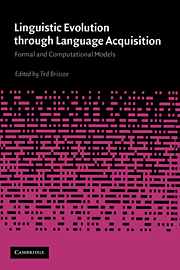Book contents
- Frontmatter
- Contents
- List of contributors
- 1 Introduction
- 2 Learned systems of arbitrary reference: The foundation of human linguistic uniqueness
- 3 Bootstrapping grounded word semantics
- 4 Linguistic structure and the evolution of words
- 5 The negotiation and acquisition of recursive grammars as a result of competition among exemplars
- 6 Learning, bottlenecks and the evolution of recursive syntax
- 7 Theories of cultural evolution and their application to language change
- 8 The learning guided evolution of natural language
- 9 Grammatical acquisition and linguistic selection
- 10 Expression/induction models of language evolution: dimensions and issues
- Index
1 - Introduction
Published online by Cambridge University Press: 23 November 2009
- Frontmatter
- Contents
- List of contributors
- 1 Introduction
- 2 Learned systems of arbitrary reference: The foundation of human linguistic uniqueness
- 3 Bootstrapping grounded word semantics
- 4 Linguistic structure and the evolution of words
- 5 The negotiation and acquisition of recursive grammars as a result of competition among exemplars
- 6 Learning, bottlenecks and the evolution of recursive syntax
- 7 Theories of cultural evolution and their application to language change
- 8 The learning guided evolution of natural language
- 9 Grammatical acquisition and linguistic selection
- 10 Expression/induction models of language evolution: dimensions and issues
- Index
Summary
Linguistic theory and evolutionary theory
Taking an evolutionary perspective on the origins and development of human language, and on linguistic variation and change, is becoming more and more common, as the papers in Hurford et al. (1998) attest. The term ‘evolution’ now crops up regularly in work emerging from the broadly generative tradition in linguistic theory (e.g. Jackendoff, 1997; Steedman, 2000). The latter development is probably a more or less direct consequence of several influential attempts to reconcile Chomskyan nativism with evolutionary theory, primarily in terms of a gradualist and adaptionist account of the origins and development of the language faculty (e.g. Hurford, 1989; Newmeyer, 1991; Pinker and Bloom, 1990). However, most of the contributions to this book owe more to the complementary but very different insight (e.g. Hurford, 1987, 1999) that not only the language faculty per se, but also the origins and subsequent development of languages themselves can be fruitfully addressed within the framework of evolutionary theory. Under this view, languages are evolving, not metaphorically but literally, via cultural rather than biological transmission on a historical rather than genetic timescale. This represents a very distinct and quite narrow theme within the broader program of integrating linguistic theory and evolutionary theory, and it is this theme which is primarily addressed by the contributors to this volume.
Evolutionary ideas have had a rather checkered history within linguistic theory despite their close mutual influence in the nineteenth century. McMahon (1994:ch12) provides a brief account of this history and also discusses linguistic work influenced by evolutionary theory during the fifties and sixties.
- Type
- Chapter
- Information
- Linguistic Evolution through Language Acquisition , pp. 1 - 22Publisher: Cambridge University PressPrint publication year: 2002
- 1
- Cited by



